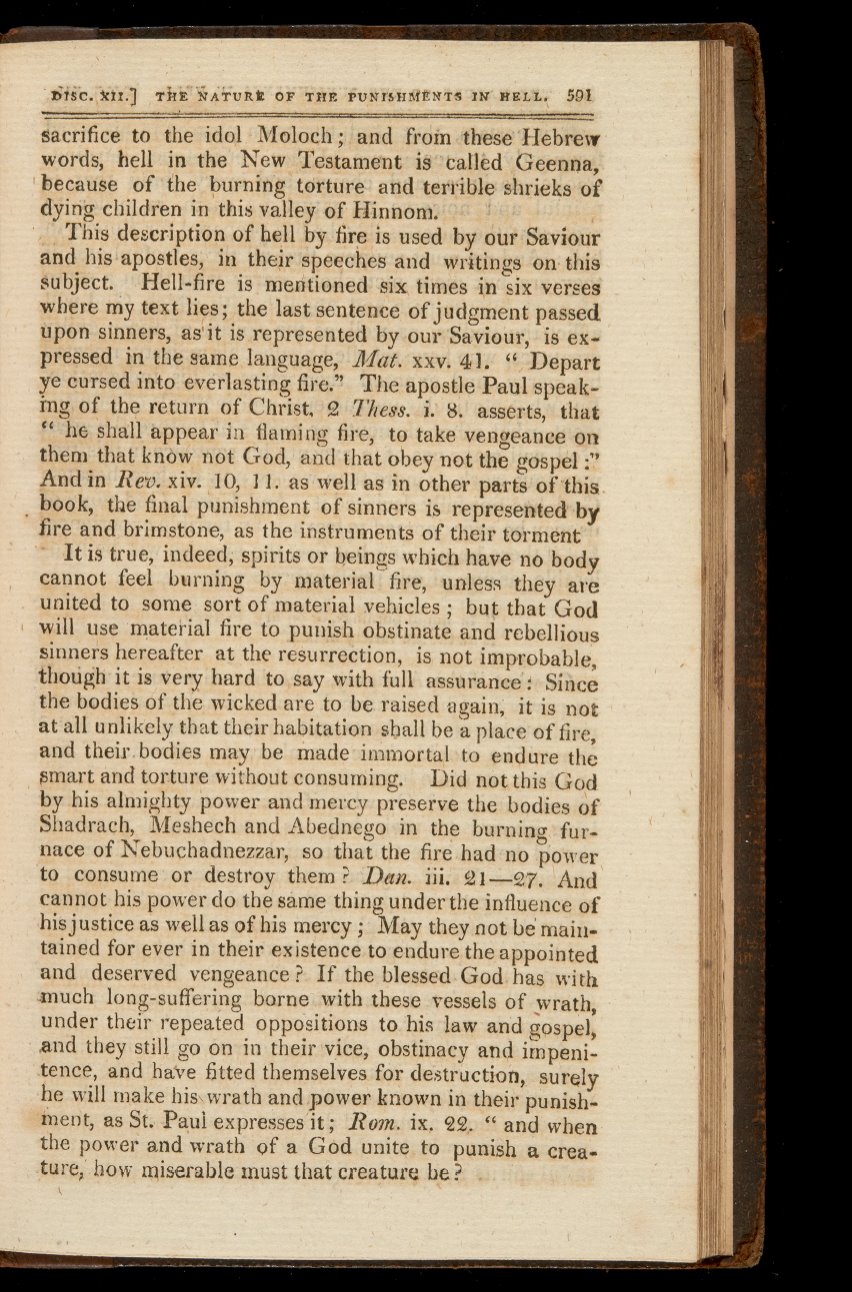

DPSC.,k12.7
ThE
NATURE
OF
THE
PUN2EH1l/ENTS
IN
HELL. 591
.
sacrifice to the idol Moloch
;
and
from these
Hebrew
words, hell in
the New
Testament
is
called
Geenna,
because
of
the
burning
torture
and
terrible
shrieks
of
dying children
in
this valley
of
Hinnorn.
This description
of
hell
by fire
is
used
by
our
Saviour
and
his
apostles, in
their
speeches and writings
on
this
subject. Hell-fire
is
mentioned
six times
in
six
verses
where
my
text
lies; the last sentence
of judgment
passed
upon
sinners,
as'it
is
represented
by
our
Saviour,
is
ex-
pressed
in
the
same language,
Mat.
xxv.
41.
"
Depart
ye
cursed
into everlasting
fire."
The apostle
Paul speak-
ing
of
the
return of
Christ,
2 Thess.
i.
S.
asserts,
that
"
he
shall
appear
in flaming fire,
to
take
vengeance on
them
that
know
not
God, and
that
obey
not
the gospel
:"
And
in
Rev.
xiv.
10, 11.
as well
as in
other parts
of
this
.
book, the
final
punishment
of
sinners
is
represented
by
fire
and
brimstone,
as
the instruments
of
their torment
It
is
true,
indeed, spirits or
beings which
have
no
body
cannot
feel
burning
by
material
fire,
unless they
are
united
to
some
sort
of
material
vehicles
;
but
that
God
will
use
material
fire
to
punish obstinate and rebellious
sinners hereafter
at
the
resurrection,
is
not
improbable,
though
it
is
very
hard
to
say with
full
assurance
;
Since
the
bodies
of
the wicked
are
to
be
raised
again,
it
is
not
at
all unlikely
that
their habitation
shall
be
a place
of
fire,
and their
bodies may
be
made immortal
to
endure
the
smart and
torture
without consuming. Did
not
this
God
by
his
almighty power and mercy preserve
the
bodies
of
Shadrach, Meshech and Abednego
in
the
burning fur-
nace of Nebuchadnezzar,
so
that
the
fire
had
no power
to consume
or
destroy
them
?
Dan.
iii.
21
-27.
And
cannot
his
power do the same thing
under
the influence
of
his
justice
as well as
of
his
mercy
;
May
they
not
be'
main-
tained for ever
in
their
existence
to
endure
the
appointed
and
deserved vengeance
?
If
the blessed
God
has
with
much
long suffering
borne
with these
vessels
of
wrath,
under their repeated
oppositions
to his law
and
gospel,
and
they
still go
on
in
their
vice,
obstinacy and
impeni-
tence, and have fitted themselves for
destruction, surely
he
will
make
his'wrath and
power
known
in
their
punish-
ment,
as
St.
Paul
expresses
it;
Rom.
ix.
22.
"
and
when
the power
and wrath
of
a
God
unite
to
punish
a crea-
ture,
how
miserable must
that creature
he?

















